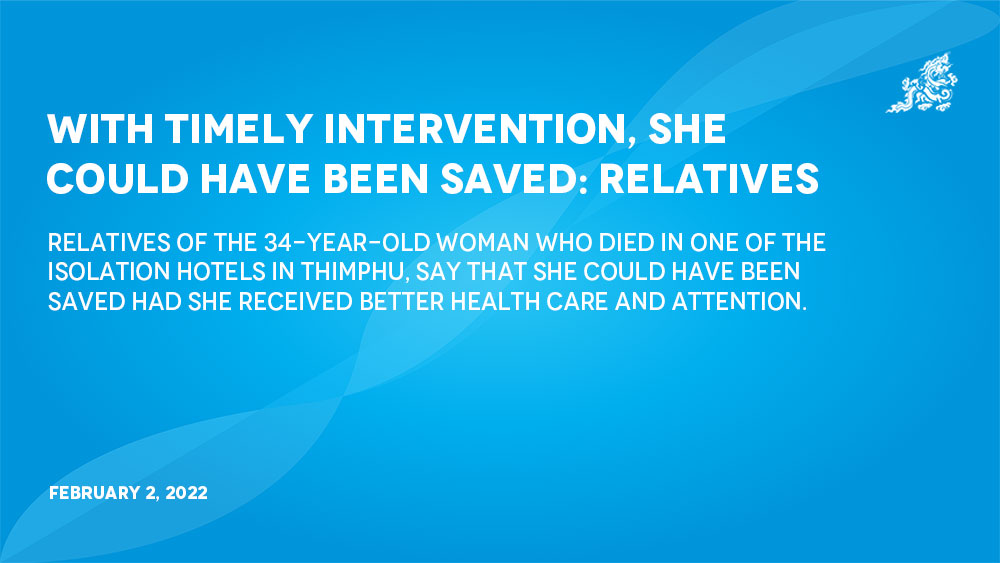Nima Wangdi
Relatives of the 34-year-old woman who died in one of the isolation hotels in Thimphu, say that she could have been saved had she received better health care and attention.
She passed away in the early morning of January 28, the fourth Covid-related death in the country.
The woman from Tshangtenang, Samtse, was a kidney patient undergoing dialysis in Phuentsholing when she tested positive for Covid-19 on January 27. She was living in Phuentsholing in a rented apartment with her two daughters, since Samtse hospital does not have dialysis facility.
Her husband, Krishna Gurung, 43, who is currently looking after their daughters, who have also tested positive for the virus in Phuentsholing, said his wife died in a hotel room without any health care facilities. “It was around midnight that she became seriously ill. I was busy trying to call up caregivers and she struggled on the bed that did not even have enough blankets to keep her warm.”
He said there were two beds in the room. “There was a thin blanket on one of the beds but without a pillow. There was nothing on the other bed.”
“As she complained about feeling cold, I boiled water and kept hot sponging her legs to keep her warm,” he said. “I did not have the number of any official to contact in case of emergency, and the fixed line in the hotel was not working. I tried calling a number that I had saved when the person called me while dropping off a pillow for the room earlier.”
Krishna said he assumed the woman to be a health worker.
He said that as his wife started to struggle and her health deteriorated, he called the number repeatedly and the person never answered. “She picked up the phone call later just to say that she is not a health worker.”
“The woman said she called me many times and I did not respond. When I said I did not receive any call on my mobile phone, she said she called on the fixed line which was not functional,” he said. “The woman texted him the mobile number of a health worker, who also never answered my calls.”
He then called 112 for an ambulance. The person responded saying that they were sending ambulance to pick up the patient, which never came. “I waited for about 30 minutes and my wife was dying. I again called and they said they were still sending it.”
Krishna said that he kept on calling that number, to which a female health worker responded towards 4am.
“By the time the health worker showed up at around 6:30am, my wife had already died. She could have been saved with timely interventions,” Krishna said.
Brother-in-law of the deceased, Rajan Gurung, 31, said all the family members are wondering why the deceased was not taken to the hospital or provided with better care at the hotel. “It was around 10pm when Mother called the deceased. She said she was cold with not enough blankets in the room, after which she did not want to continue the conversation.”
Health people knew she was a kidney patient and had tested positive for the virus. He said this was the sole reason why she was referred to Thimphu from Phuentsholing. “Putting her on dialysis that day could have saved her. The patient had reached Thimphu around 1pm and everything could have been managed.”
Krishna said: “Even in Phuentsholing, which is a red zone, despite the deceased having to undergo dialysis three days a week, she was not admitted to the hospital. This is how she contracted the virus when she had to keep on traveling from her house to the hospital every time.”
Health official clarifies
Technical Advisory Group member Dr Tshokey said that the deceased was a dialysis patient in Phuentsholing receiving regular dialysis, which is usually two times a week. “She had received dialysis three days back when she was referred to Thimphu. She tested positive for the virus when she came for the next dialysis.”
He said: “We do not have a dialysis facility at the isolation ward in Phuentsholing and she had to be referred to Thimphu.”
Dr Tshokey said the doctors in Phuentsholing assessed her before sending her to Thimphu and she showed no symptoms of Covid-19. She did not have any respiratory problem and was stable when she reached Thimphu.
“Since she reached Thimphu in the evening that day without any signs and symptoms of Covid, we had scheduled her dialysis at 9am the next day, as other patients took turns,” he said. “Nursing staff at the hotel had also assessed the deceased on her arrival and she was found to be stable. She probably went into cardiac arrest early the next morning and it looked like she had a myocardial infarction. It is not that she was neglected or that she succumbed Covid-19.”
Explaining why the deceased was not admitted in Phuentsholing hospital before testing positive, he said that usually unless the kidney patients have medical conditions like breathing difficulty and shock, they aren’t admitted to the hospital. They return home from the hospital after the dialysis.


